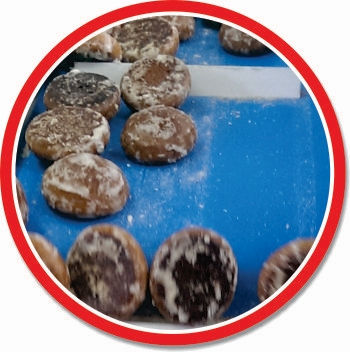



Types of
Conveyor Belts
20 years of experience in the production of conveyor belts
2 tape production workshops
• large number of presses
• vulcanization capacity: 100 mm to 3000 mm
2 mobile tape vulcanization teams at the customer's premises
Large quantities of conveyor belts
Fast fulfillment of orders

National coverage
Iasi + Workshop + Mobile team
Bucharest + Workshop + Mobile team
We currently use 15 types of food grade belts materials and 12 types of belts for general applications, of which we have hundreds of square meters in stock.
Also, our company is a direct importer of:
-
rubber belts;
-
metal belts;
-
Teflon belts;
-
modular belts;
-
belts for calenders (industrial laundries).
The range of conveyor belts and process belts sold provides solutions for any problem and situation in the production processes (food industry, printing industry, textile, milling and bakery, marble, airport or logistics segment).
The belt structure has a top layer (smooth, corrugated or other profiles) and one or more intermediate layers of reinforcement (rigid or flexible).
We currently use 15 types of food grade belts materials and 12 types of belts for general applications, of which we have hundreds of square meters in stock.
Also, our company is a direct importer of:
-
rubber belts;
-
metal belts;
-
Teflon belts;
-
modular belts;
-
belts for calenders (industrial laundries).
The range of conveyor belts and process belts sold provides solutions for any problem and situation in the production processes (food industry, printing industry, textile, milling and bakery, marble, airport or logistics segment).
The belt structure has a top layer (smooth, corrugated or other profiles) and one or more intermediate layers of reinforcement (rigid or flexible).
Photo gallery
Belts for general industrial applications:
-
Assembly lines
-
Logistics warehouses
-
Airports
-
Automotive
-
Building Materials
-
Woodworking
-
Waste processing
Belts for the food industry:
- belts with resistance to vegetable, animal, mineral and other chemical fats, are suitable for contact with all types of food products. The belts are FDA/USDA certified.
-
Bakery - Yeasters, shaping, rolling, laminating machines
-
Pastry
-
Puff pastry machines
-
Chocolate - Icing
-
Meat processing
-
Casing, shaping
-
Sugar factories
-
Packaging lines
Conveyor belt without joint - 180 °
Conveyor belt without joint - 180 °
Types of belts
WPU series (available in several colors: white, blue, green)
They are belts with a hardness of 88° or 92° Shore A.
The belts are made of polyurethane resistant to mineral oils, greases.
Belts in this category are suitable for transporting food of any kind as approved by FDA/USDA.






Series BC
Belts with flexible polyester reinforcement, impregnated on both sides with polyurethane for a low coefficient of friction.
These belts are suitable for transport with accumulation, cutting benches, textile industry.
They are also recommended for working conditions with the presence of muddy fluids, oily, greasy substances and non-aggressive chemical agents.
Series WPV D
Belts with a transport surface hardness of 68° Shore A.
Belts in this category have antistatic properties and are flame resistant according to DIN-ISO-AFNOR norms, suitable for working in areas with a risk of explosion. They are recommended for sugar processing in all production phases and for the entire range of bucket elevators in the field of milling, canning and food processing in general.
Series WPV
Belts with a transport surface hardness of 72° Shore A.
They are resistant to fats, animal, vegetable and mineral oils.
Belts in this category are suitable for transporting food of any kind as approved by FDA/USDA.
Series GPVR
Belts with a hardness of 56° Shore A.
Belts with surface finished by deep embossing. They are indicated for grinding, calibrating and polishing machines in the wood industry.

Series WSIL
Silicone bands and polyester reinforcements.
Non-toxic and non-stick.
Recommended for equipping packaging lines, wrapping machines or other applications that do not require adhesion.
Series LPVM
PVC belts, with a surface hardness of 46° - 55° ShoreA.
Elastic and flexible surface with a high coefficient of friction.
Low resistance to abrasion and grease. The surfaces are printed in relief with structures studied for the inclined transport of products and can be made according to needs.


Series NPV
PVC belts, antistatic, for the logistics field.
They have surfaces of different hardness depending on the use:
45° ShoreA for inclined transport;
68° ShoreA for horizontal transport;
80° - 90° ShoreA where good abrasion or build-up resistance is required.
The belts in this series have flame resistance according to DIN-ISO-AFNOR norms.


Series WBCPU
-
Polyurethane belts with textile inserts, having the hardness of the covering layer 88° or 92°ShoreA.
-
Polyurethane with excellent resistance to vegetable, animal and mineral fats and oils, corrosion.
-
Recommended for contact with any type of food products according to FDA/USDA.

Series UPV
-
PVC belts with a hardness of 74° ShoreA.
-
Standard series for the transport of processed products.
-
The upper layer has a structure specially studied for the processing of marble, granite, stone and ceramics. Optimal resistance to abrasion, oils and fats, hydrocarbons, detergents.




Conveyor belt machines
-
9 presses for vulcanizing conveyor belts or for workshop production, with splice lengths between 100 mm and 3,000 mm.
-
Machines for the automatic vulcanization of accessories specific to conveyor belts: sidewall (mobile side walls), trapezoidal guides.
-
Machines for the preparation of the joint before vulcanization for the execution of several types of joints: simple finger, finger over finger, step overlap straight.
-
Machines for making tapes with mixed joints: mechanical and vulcanized; process consisting of splitting the material, fixing the zipper, vulcanizing the zipper resistance element on the two ends of the tape.


















































